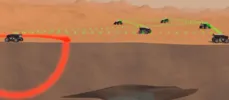NEPOS: Near-Surface Seismic Exploration of Planetary Bodies with Adaptive Networks

Ground motion observations on planetary objects are a prerequisite for a detailed understanding of their interior structure and evolution. The imaging of the near surface structure - in particular on the Moon - has strong practical implications. First, the race is on to detect ice-bearing rocks near the surface from which water could be extracted and used as a resource for crewed missions. Second, due to the substantial bombardment of the lunar surface with meteorites and the lack of an atmosphere, observatories or habitats may have to be built underground. It has been proposed that cavities from ancient lava flows below the lunar surface could be used to place infrastructure.
Current mission plans for geophysical exploration focus on static seismic sensors/arrays that would be restricted to the area they can explore. With the NEPOS project we want to go beyond these restrictions and develop concepts for mobile seismic arrays that work in an autonomous way using robotic technology. A specific focus of this project is on aspects of experimental design and optimization, search and mobility aspects, and the automated seismic data processing and analysis. The scientific challenges include the understanding of wavefield effects of icy rocks and caves in a strongly scattering environment, the provision of optimal source-receiver configurations to detect them, as well as an integrated data-processing workflow from observation to subsurface image including the quantification of uncertainties. The outcome will be detailed technical specifications that can support the next level of development in terms of network agent hardware, IT components, and software implementation of the entire system in future missions. Thus, the main project goals include:
1) The development of concepts for (active and passive) near-surface seismic exploration on planetary objects,
2) the design of strategies for mobile near-surface imaging in strongly scattering media and
3) the development of concepts for an autonomous, mobile sensor array, which will be tested on Earth.
More details can be found on the NEPOS Website.
Partners:
- Ludwig-Maximilians-University Munich
- German Aerospace Center (DLR)
Publications
Keil, S., Sesko, R., Prieto Lazaro, A., Igel, H., Reiss, P.,.: Seismic Interferometry for Detecting Ice-Bearing Rocks on the Moon, European Lunar Symposium 2025, Münster, 22-27 June 2025. 10.5281/zenodo.15474905
Nierula, K., Shutin, D., Shin, B., Igel, H., Keil, S., Bernauer, F., Reiss, P., Sesko, R., Lindner, F.: Probabilistic Approach toward Seismic Exploration with Autonomous Robotic Swarms. EGU 2024 - Presentation
Keil, S., Igel, H., Bernauer, F., Shutin, D., Shin, B., Nierula, K., Reiss, P., Sesko, R., Lindner, F.: The NEPOS Project: Near-Surface Seismic Exploration of Planetary Bodies with Adaptive Networks. EGU 2024 - Poster
Keil, S., Igel, H., Bernauer, F., Shutin, D., Shin, B., Reiss, P., Nierula, K., Sesko, R., Rossi, Y.: The NEPOS Project: Near-Surface Seismic Exploration of Planetary Bodies with Adaptive Networks. AGU 2023.
